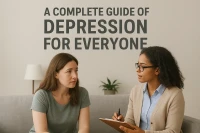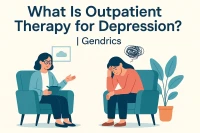Starting therapy for depression can be tough. You might feel overwhelmed. It's normal to wonder what to discuss or how to initiate those important conversations. Many people fear saying the wrong thing. They worry about not having enough to talk about. Some feel too vulnerable to share their deepest struggles.
Understanding Depression and Therapy's Role
Depression impacts millions globally. It brings sadness, hopelessness, and disconnection. These feelings can make everyday life very hard. The National Institute of Mental Health states that therapy is a leading treatment for depression. Studies show that talk therapy helps about 80% of those who try it.
Therapy for depression provides a safe space to explore your thoughts and feelings. A trained professional guides you, helping you understand depression and develop coping strategies.
Why Preparation Matters
Knowing what to discuss in therapy can help alleviate hesitation and enhance results. When you have topics in mind, you feel more confident. This helps you use your session time better. Many people spend the first few minutes of therapy trying to find the right words to express themselves. This can make the session feel awkward or unproductive.
Making a mental list or jotting down notes can help you feel ready. This way, you can tackle the key issues that impact your mental health and daily life.
Understanding Therapy for Depression
Before we talk about therapy topics for depression, let's first understand how therapy works. You should understand what to expect during the process.
Types of Therapy for Depression
Standard therapies for depression include:
- Cognitive Behavioral Therapy (CBT): This helps you spot and change negative thoughts.
- Talk Therapy or Psychotherapy: This focuses on exploring your feelings and experiences.
- Interpersonal Therapy: This addresses relationship issues that may contribute to depression.
Counseling and therapy are similar. Both involve working with trained professionals to tackle mental health issues. Therapy often explores deep psychological issues. Counseling, on the other hand, focuses on specific problems or life situations.
How Sessions Are Structured
Therapy sessions usually last 45-50 minutes. During this time, you and your therapist talk about what matters most to you that day. Your therapist may ask questions to steer the talk, but you control the topics you want to discuss.
Therapy is different for everyone. Most people feel that sessions get easier and more effective over time. They build trust with their therapist. As a result, they improve their communication skills.
Building Communication Skills
The importance of open communication with your therapist cannot be overstated. To communicate effectively with a therapist, be honest about your feelings and thoughts. Ask questions if something is unclear. Share both good and bad experiences.
Many people wonder if they should disclose everything to their therapist. You don't need to share more than you feel comfortable with. However, being open and honest usually leads to better treatment results.
Common Topics to Discuss in Therapy for Depression
Knowing what to discuss in therapy helps you use your time well. It also ensures you focus on the key parts of your depression.
Daily Mood and Emotional Patterns
Daily mood and emotional changes are key to discussing. They help your therapist see patterns in your depression. You can discuss if you feel worse in the morning or evening. Reflect on how your mood affects your daily activities. Also, consider which situations make your depression symptoms stronger.
Why do I get depressed at night? It is a common concern that many people bring to therapy. Your therapist can help you find what affects your mood in the evening. They can also help you create ways to manage these changes.
Core Depression Symptoms
Hopelessness, sadness, and worthlessness are key signs of depression. They need ample discussion time.
Describing depression can be tough. You might explain it like this:
- You feel a profound sadness that doesn't subside.
- It's hard to enjoy things you once loved.
- You often feel like things will never improve.
These feelings can make it hard to connect with others, even your therapist.
Can you be depressed without feeling sad? This is an important topic. Many people think of depression as numbness, anger, or physical fatigue, not just sadness.
Physical and Lifestyle Impact
Sleep, appetite, and lifestyle changes often go hand in hand with depression. These changes can give your therapist valuable insights.
You can talk about problems like:
- Trouble falling asleep
- Sleeping too much
- Changes in eating habits
- Issues with daily routines
To stop feeling sad all the time, you should look at both the physical and emotional sides of depression.
Identifying Triggers and Stressors
Triggers, stressors, and recent life events help your therapist see what makes your depression worse. This may include issues such as relationship problems, work stress, or financial difficulties. It can also involve significant life changes, such as moving or losing someone close to you.
Tracking Progress and Setbacks
Progress, setbacks, and coping challenges are key topics to address. They help you and your therapist see how well treatment is working. It's essential to discuss both progress and challenging and tough times. Setbacks are a regular part of recovery.
Personal Experiences and Feelings
.webp) Therapy offers a safe space to discuss personal experiences. It's a discussion about things that are difficult to share with friends or family.
Therapy offers a safe space to discuss personal experiences. It's a discussion about things that are difficult to share with friends or family.
Relationship and Social Impact
Depression can significantly impact your relationships and social life. It often puts distance between you and the people you care about. You might mention feeling lonely, struggling to maintain friendships, or experiencing family problems.
Living with someone who has depression can be important if you're worried about how it impacts your family or partner.
Processing Difficult Emotions
Discussing guilt, shame, or past experiences helps you understand emotions that can worsen your depression. Many people feel guilty about their depression or ashamed that they can't just "get over it" on their own.
Your therapist can show you that depression is a medical issue, not a personal flaw. They will help you work through these tough feelings.
Celebrating Small Victories
Sharing small wins is key to building momentum in recovery. Every success, no matter how minor, matters. This could mean getting out of bed on a tough day, finishing a task you've been putting off, or having a good chat with someone.
Small victories are important in recovering from depression. They deserve recognition and discussion in therapy.
Goals and Expectations in Therapy
Working with your therapist on clear goals and realistic expectations keeps you both focused on the same results.
Setting Realistic Recovery Goals
Setting realistic recovery goals means knowing that recovering from depression takes time. It's usually a slow process, not a quick fix.
You might set goals such as:
- Developing better sleep habits.
- Improving communication with family.
- Learning coping strategies for challenging emotions.
What you want from therapy depends on your situation. Common goals include:
- Reducing the symptoms of depression.
- Improving daily functioning.
- Developing long-term coping skills
Evaluating Coping Strategies
Discussing coping strategies that work or don't helps your therapist adjust your treatment. This way, it better fits your needs. You could try stress management techniques, exercise routines, meditation, or other tools to help with depression.
To get through a depression episode, it's key to have a toolkit. This toolkit should include coping strategies for when your symptoms get worse.
Understanding Timeline Expectations
Understanding the distinction between short-term and long-term expectations is crucial. Some improvements can happen fast, but lasting recovery often takes longer. Recovery time from depression varies a lot. However, many people notice some improvement within a few months of regular therapy.
Questions to Ask Your Therapist
Having questions ready can help you get more from your therapy sessions. It also makes sure you understand your treatment plan.
Treatment Strategy Questions
What strategies can help manage depressive symptoms? This question brings up techniques, lifestyle changes, and skills to practice between sessions.
Does therapy help everyone? This is a valid question. Therapy works for many people with depression. However, finding the right therapist and approach that suits your needs is key.
Lifestyle and Self-Care
Are there lifestyle changes that can help support therapy? You might discuss exercise, nutrition, sleep habits, or social activities. These can all complement your therapy work.
Finding meaning in life during depression is a common topic in therapy. Many people seek to rediscover their purpose and joy in everyday activities.
Monitoring Progress
Knowing if therapy is working is key to understanding if your approach is effective. Your therapist can help spot signs of progress. They can also talk about changes if needed.
Medical Considerations
When should therapists use medication with therapy? This is an important question, especially if treatment alone isn't enough. Your therapist can help you understand when a psychiatric consultation might be helpful.
Overcoming Hesitation in Talking About Depression
Many people find it hard to open up in therapy. This is especially true in the first few sessions.
Understanding Common Barriers
Some people struggle to open up. They may fear that others will judge them. Others worry about being vulnerable or saying the wrong thing. These feelings are normal. They often lessen as you build a trusting relationship with your therapist.
Opening up in therapy requires practice and patience. As you go along, you'll learn to share more personal details about yourself.
Practical Strategies for Communication
Tips for easing into tough talks include beginning with lighter topics. Then, you can move on to more personal issues. Consider discussing daily challenges before moving into deeper emotional territory.
In therapy, express your concerns clearly and directly. Ask for clarification if needed. Remember, your therapist handles tough topics with care.
Preparation Techniques
Journaling or taking notes before sessions can help you remember key topics. It also makes you feel more organized during appointments. To prepare for therapy, write down your thoughts, questions, or experiences that you would like to discuss.
In therapy, Reddit discussions often suggest keeping a mood journal. You can also take notes on important events that happen between sessions.
Conclusion
Talking about the right things in therapy for depression can improve your treatment. It also boosts your confidence in the process. Therapy is your time to prioritize and focus on your mental health. You can explore your feelings and build tools to manage depression.
The topics you discuss will change as you go through treatment. What feels important to talk about may vary from session to session. This flexibility is normal and healthy. Your therapy should adapt to your changing needs as you progress in your recovery.
Your therapist is there to support you without judgment. They are here to help with mood swings, past experiences, recovery goals, and treatment choices. Therapy can help based on how open you are to the process. It's important to explore topics that affect your mental health.
At Gendrics, we know starting therapy can be daunting. However, talking about your depression and mental health shows strength and self-care. Seeking help shows your commitment to your well-being and recovery.
As you build trust with your therapist, deciding what to discuss will feel more natural. You'll get more comfortable sharing your experiences. Therapy is a team effort. You and your therapist work together to reach your mental health goals.

.webp)



Comments